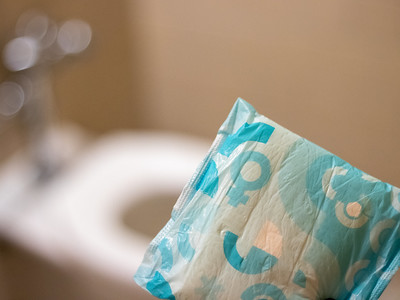Let’s face it, menstruation is a natural bodily process that affects many people at some point in their lives. A great majority of people who menstruate are forced to deal with it for about a week out of every month. It is not sexy, flashy or particularly fun to talk about and often is accompanied by pain and discomfort – certainly something most people would choose to remove from their lives. Unfortunately, it isn’t a choice.
Here at the University of Massachusetts, tampons and pads are treated as luxury items. Despite 50 percent of the university population identifying as female, access to sanitary products is shockingly difficult. They are either not present in restrooms or are hidden away in a coin-operated dispenser making them neither free nor easily accessible to students who need them. Since they are not readily available if a person is in need, there are only three options they can try: to bum one off of a friend, hike all the way back to their dorm for products purchased off-campus or go purchase an entire box from the Campus Store. None of these options are particularly comfortable, convenient or time efficient.
In a national poll of US menstruators age 18-55 conducted by the Free the Tampons project, 79 percent of people who menstruate have “engineered” a pad out of toilet paper, 53 percent have asked a friend for one, 48 percent have obtained one from a public dispenser and 34 percent went home immediately. Of these menstruators polled, only 8 percent say that the public dispensers work all the time. As you can see, not only does not having free access to tampons and pads prove inconvenient it also forces menstruating people to take time out of their day to find these products, often when they are already not feeling well.
In addition to the inconvenience, there is also an emotional component to this ordeal. In the same poll, 57 percent of menstruators said they would feel embarrassed if they were caught in public without supplies, 43 percent would feel anxious and 35 percent would feel panicked. The only comparison I can think of for those who have never experienced this is to imagine having to walk to the Campus Center to buy a roll of toilet paper when you have to use the bathroom. When framed that way anyone would say that it is preposterous and an unfair way to handle such a natural biological function. So why are periods treated any differently?
Some may argue that providing these products is a costly expense which is not the University’s responsibility, or that a period is a private event that a person should be prepared for. However, I would counter that these products are needs, not wants, and providing them would help improve bathroom equality on our campus. UMass has excelled in other areas of public health, for instance, ensuring that all students have unhindered access to condoms. All Residence Assistants are required to have and provide them, and they can be found all over campus. If the school can provide free and easily accessible condoms to all of its students, why should tampons be any different?
In conclusion, there are a few simple solutions I would like to propose for UMass administrators to consider: to retrofit the already existing machines to dispense sanitary products without the 25 cent toll that currently exists and to outfit each restroom on campus with a box or basket which contains basic sanitary supplies that can be used by any student in need. In order for these solutions to work, we as members of the UMass community would need to be diligent to ensure that these boxes are looked after and supplied regularly by the University. If we make headway, I believe it will have a great impact on the wellbeing and comfort of the University’s menstruating students. In our western culture, access to sanitary products should be a basic right. That is why I propose a campus-wide initiative to make these products free and accessible to those who need them.
Juliana Sopko is a Collegian contributor and can be reached at [email protected].



















